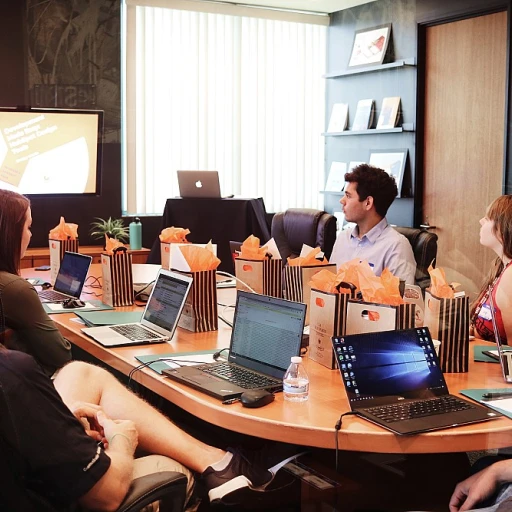
Understanding the HR Recruiter's Role
Defining the Responsibilities and Impact
The role of an HR recruiter within an organization forms the backbone of the recruitment process. It involves more than just sifting through stacks of resumes. Recruiters are dynamic players in an ever-evolving landscape that requires them to balance a company's talent acquisition strategies with effective communication and relationship management. Understanding the intricacies of this role is essential to improving the candidate experience. Recruiters are tasked with more than just filling open positions. They must identify and attract top talent, ensuring the candidates align with the company's culture and job requirements. One of the critical responsibilities of an HR recruiter is to craft compelling job descriptions that reflect the needs of the position while captivating the interest of potential candidates. This might involve collaborating with hiring managers and executives to fine-tune the requisite skills and qualifications. In today's digital age, recruiters are leveraging social media platforms and job boards as essential tools in their search strategies. Technology assists recruiters in reaching a broader pool of qualified candidates efficiently. As recruiters navigate these platforms, they must remain vigilant in addressing the various stages of the recruiting process. From initial contact through the final hiring decisions, maintaining a positive and professional image is crucial. But the recruiter's job doesn't end there. After engaging with candidates, recruiters must pivot to fostering employee relations and maintaining a dialogue with everyone involved in the hiring process. As situations evolve, so does the need for recruiters to adapt their approach. By soliciting feedback and genuinely valuing candidate input, companies can better align their practices and address any challenges that may arise. A recruiter’s ability to build relationships and communicate effectively can significantly influence the overall Candidate Experience. Therefore, it is essential for HR recruiters to continually hone their skills and update their strategies to meet the evolving demands of talent acquisition. For more insights into how recruiters can redefine their role, explore this comprehensive guide on the role of a recruiter. As we delve deeper into the importance of effective communication, implementing technology, and personalizing candidate interactions, it becomes clear that the HR recruiter is at the heart of transforming these experiences for the better.The Importance of Effective Communication
Communication as the Bridge to Successful Recruitment
In the often intricate world of human resources, mastering the art of communication is more crucial than ever for recruiters. Effective communication serves as the bridge that connects recruiters with potential candidates, ensuring the recruitment process runs smoothly and efficiently. It can significantly influence the outcomes of any recruitment endeavor, from executive search to filling routine positions. Firstly, clarity and transparency in job descriptions are vital. Candidates seek information they can trust, so it's paramount that hiring managers and recruiters ensure job descriptions are detailed, accurate, and reflective of the role requirements. This initial communication can set the tone for the entire hiring process, enabling potential candidates to self-assess and determine if they are qualified candidates for the role. Recruiter skills must encompass active listening, a critical component in understanding the needs and concerns of candidates throughout the recruiting journey. This active engagement helps to build a rapport with candidates, making them feel valued and understood, thereby enhancing their overall experience. Addressing questions and concerns promptly reflects the company's commitment to candidate welfare and respects their time and effort in the recruitment process. Moreover, technology's role in communication cannot be ignored. Leveraging platforms such as social media and job boards effectively extends the reach to top talent and aids in creating a seamless communication process. However, while technology aids in efficiency, maintaining the human touch is non-negotiable. Personalized interactions and consistent updates further reinforce a candidate's positive perception of the company. Recruiters should also collaborate closely with hiring managers and other human resource professionals to ensure consistent messaging. Synchronizing efforts across the board not only fills positions more effectively but also aids in building a cohesive candidate experience strategy. Working as a team enhances resources, allowing for more personalized approaches and better alignment with the company's values and culture. To gain deeper insights into enhancing those coordination efforts, consider reading about more specific roles involved in candidate experience and how they can contribute. Ultimately, highly effective communication shapes the recruitment landscape, impacting how qualified candidates view the company throughout their journey. By fostering communication skills, recruiters not only elevate the candidate experience but also position their company as a desirable and trustworthy employer.Leveraging Technology in Recruitment
Integrating Digital Tools to Transform Hiring
Leveraging technology in recruitment has become pivotal in transforming the hiring landscape. For HR recruiters, utilizing these digital tools can streamline the recruitment process while enhancing the overall candidate experience. In the modern world of talent acquisition, human resources departments are increasingly embracing a variety of digital platforms and technologies. These resources are designed to help recruiters fill positions more efficiently, search for qualified candidates, and maintain effective employee relations.- Automation of Mundane Tasks: By automating repetitive tasks such as scheduling interviews or screening potential candidates, recruiters can focus on what truly matters—engaging with top talent. This shift allows human resource professionals to dedicate more time to building meaningful relationships with candidates and ensures a more personalized interaction.
- Utilizing Advanced Analytics: Data-driven insights provided by advanced analytics tools can aid in refining job descriptions and identifying qualified candidates more effectively. These analytics can also assist in tracking recruitment metrics, helping companies improve their hiring process by evaluating what strategies work best.
- Enhancing Communication: Digital tools such as AI-powered chatbots facilitate clearer and quicker communication, providing immediate responses to candidates' questions. This not only improves candidate experience but also ensures that potential candidates remain engaged throughout the recruitment process.
- Social Media Integration: Platforms like LinkedIn and other social media are valuable allies. They enable recruiters to perform executive searches, connect with both active and passive candidates, and keep their talent pipeline full.
- Mobile-Friendly Applications: Ensuring that application processes are mobile-optimized can significantly enhance candidate engagement. Today's job seekers often rely on their smartphones during their job search, so a seamless mobile experience can be a game-changer.
Personalization in Candidate Interactions
Creating Meaningful Connections with Candidates
In the realm of recruitment, personalization is a key factor that can significantly enhance the candidate experience. Human resources professionals and recruiters are increasingly recognizing the value of tailoring interactions to meet the unique needs and preferences of each candidate. This approach not only helps in attracting top talent but also in retaining their interest throughout the hiring process.
Personalization begins with understanding the candidate's journey. From the moment a potential candidate engages with a job description to the final stages of the interview process, every touchpoint offers an opportunity for recruiters to make a lasting impression. By customizing communication and interactions, recruiters can demonstrate genuine interest in the candidate's skills and aspirations.
Strategies for Personalization
- Customized Communication: Tailor your messages to address the specific interests and qualifications of each candidate. This can involve referencing their previous experiences or aligning the job role with their career goals.
- Interactive Interviews: Use interview questions that not only assess the candidate's qualifications but also allow them to express their individuality. This can help in creating a more engaging and meaningful dialogue.
- Leveraging Social Media: Utilize social media platforms to connect with candidates on a more personal level. Sharing relevant content and engaging with candidates' posts can build a rapport even before the formal interview process begins.
- Feedback and Follow-up: After interviews, provide personalized feedback that highlights the candidate's strengths and areas for improvement. This not only aids in their professional development but also reinforces the company's commitment to a positive candidate experience.
By implementing these strategies, recruiters can transform the recruitment process into a more human-centric experience. This not only helps in filling positions with qualified candidates but also strengthens the company's reputation as an employer of choice.
Gathering and Implementing Candidate Feedback
Gauging Candidate Perceptions and Making Improvements
In the realm of recruitment, understanding candidate experience is pivotal in attracting and retaining top talent. A crucial way to enhance this experience is by actively gathering and implementing candidate feedback. This step, often overlooked, can offer valuable insights into the recruitment process and help identify areas needing improvement.
Firstly, it's essential for human resources teams and recruiters to develop a systematic approach to collecting feedback. This can be achieved through surveys or interview follow-ups. The feedback should focus on various stages of the hiring process—from initial contact to the interview and final decision making. By asking specific interview questions related to the candidate's experience at different points, recruiters can gather diverse perspectives.
Feedback collection should be an ongoing effort, not a one-time task. Consistent engagement with potential candidates can provide insights into evolving needs or pain points in the job search process. It's also beneficial to use multiple platforms such as social media and job boards to evaluate candidate perceptions across different demographics.
Once feedback is compiled, it's vital for recruiters to analyze and implement changes to address any concerns or improve positive experiences. Adjusting job descriptions, restructuring the recruiter interview process, or refining employee relations initiatives can significantly enhance the candidate journey.
Lastly, sharing the changes made based on feedback with candidates and hiring managers can build trust and show that their input is valued. This transparency not only improves the employer's brand but also encourages a more engaged and motivated pool of qualified candidates in future recruitment cycles.
Addressing Challenges in Candidate Experience
Navigating Potential Hurdles for a Seamless Experience
In the world of recruitment, HR recruiters encounter various challenges that can impact the candidate experience. These hurdles require effective strategies to ensure potential candidates do not feel overlooked or undervalued during the hiring process.- Managing Communication Bottlenecks: Clear and timely communication is crucial. Recruiters often struggle with maintaining consistent interaction due to high volumes of applicants. Leveraging tools and technology, as previously discussed, can bridge this gap, ensuring that every candidate remains informed at each stage of their job application.
- Balancing Personalization with Scalability: Personalizing interactions with candidates can become increasingly difficult as talent pools grow. However, prioritizing personalized communication, even through automated solutions, can help candidates feel unique and valued.
- Feedback Implementation: Collecting feedback from candidate interactions can be straightforward, yet implementing changes based on this feedback can pose a challenge. It's essential for recruiters and human resources teams to consistently analyze candidate feedback and adapt hiring processes to meet expectations better.
- Identifying Qualified Candidates: Recruitment involves sifting through numerous applications to find top talent. This can be overwhelming and could lead to missed opportunities. Employing efficient search strategies, like executive search techniques, helps streamline this process to identify qualified candidates swiftly.
- Ensuring Diverse Talent Pools: Attracting a wide range of talented individuals is vital for both the candidates and the company. Recruiters must work towards creating inclusive job descriptions and utilize various platforms, including social media, to reach diverse job boards and networks.













